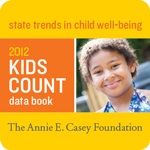Economic Crisis Continues Detrimental Impact on the Well-Being of Our Children
 New National KIDS COUNT Index Ranks Florida Economic Well-Being of Children 44th Among the 50 States.
New National KIDS COUNT Index Ranks Florida Economic Well-Being of Children 44th Among the 50 States.
Policymakers and child advocates can now be better informed about the well-being of children nationally and by state, due to a new index measurement used this year by the Annie E. Casey Foundation in the national release of their 2012 KIDS COUNT Data Book. The new index takes advantage of advances in knowledge and availability of state-level data and expands from 10 to 16 indicators placed into four domains: Economic Well-Being, Education, Health, and Family and Community.
Although the national overall ranking of 38 puts Florida among the bottom ranked states, data does demonstrate that Florida has made some gains in nine of the 16 indicators. Within this mixed picture for Florida, the data book also reveals 49 percent of Florida children live in households with a high housing cost burden, meaning that more than 30 percent of monthly household income is spent on rent, mortgage payments, taxes, insurance, or related expenses.
While a modest increase in the percentage of children with health coverage is shown, Florida has over a half million children without any form of health coverage. Poor health during childhood impacts critical aspects of a child’s life, such as school readiness and attendance. An initial glance in the report’s Education domain reveals Florida has improved in all four indicators, yet a closer look shows the numbers are still too high. Sixty-five percent of fourth graders are not proficient in reading and 72 percent of eighth graders are not proficient in math. The effects of poverty are compounded by years of underinvestment in systems like education and health care, affecting the opportunity that children have to thrive.
“To continue to improve the lives of the children in Florida, we must provide our communities with the assistance they need to feed, house, and educate our families,” said Susan Weitzel, Florida KIDS COUNT director. “When children are going to school hungry and do not know if they have a place to sleep at night, how can they be successful in the classroom?”
Weitzel is referring to the disturbing data on family and economic security, which reveals that kids and families in Florida continue to struggle in the wake of the recession. Data in this report show that Florida’s children are growing up with risk factors that predict they will not succeed in the state they will inherit, challenging Florida’s ability to compete and thrive in the global economy.
“We must begin to make changes now,” added Weitzel. “It may take a little longer to strengthen our economy, but a lot can be done to strengthen communities so that supports are in place to ensure children and families have a greater chance of success.”
The KIDS COUNT Data Book with state-by-state rankings and supplemental data can be viewed at http://datacenter.kidscount.org. For complete details and supporting materials on Florida, visit www.floridakidscount.org.
View CFS efforts to strengthen communities.
Florida KIDS COUNT (FKC) is part of a Nationwide KIDS COUNT Network and project of the Annie E. Casey Foundation. FKC disseminates national, statewide and county-level data on key indicators for Florida’s children. KIDS COUNT® is a registered trademark of the Casey Foundation.